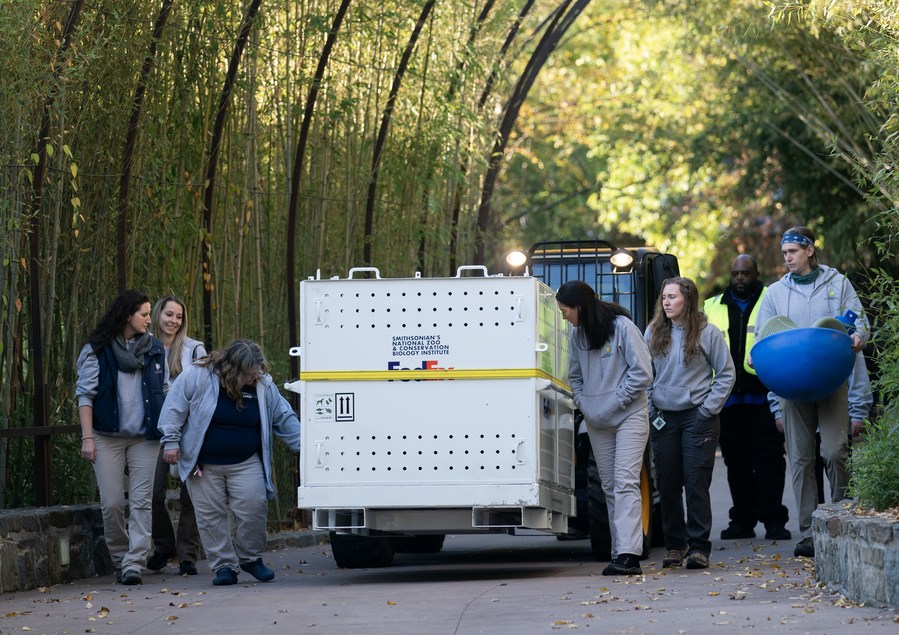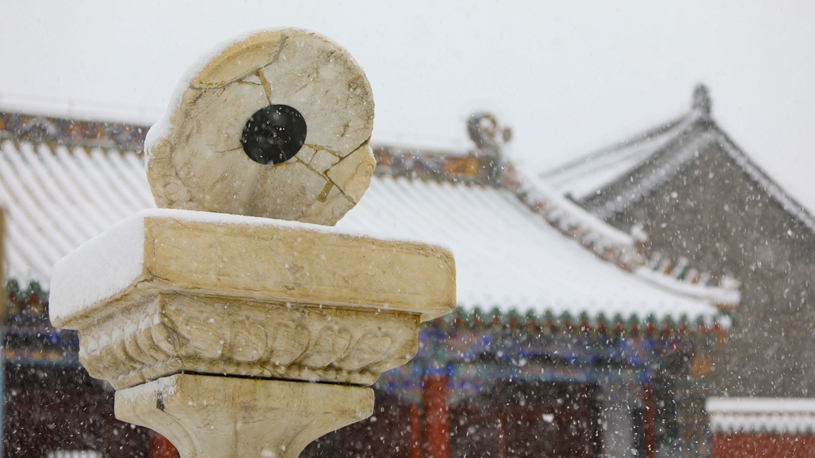
An airplane transporting giant pandas takes off from the Dulles International Airport in Dulles, Virginia, the United States, on Nov. 8, 2023. (Xinhua/Liu Jie)
"It's a moment with some heartbreak in it, but it is also a moment of joy, because we are celebrating the success of the world's longest running conservation program for a single species," said Brandie Smith, director of Smithsonian's National Zoo and Conservation Biology Institute.
by Xinhua writers Deng Xianlai and Xu Yuan
WASHINGTON, Nov. 9 (Xinhua) -- On the tarmac of Dulles International Airport near Washington, D.C. on Wednesday, giant panda Mei Xiang caught what would perhaps be her last glimpse of the U.S. capital.
It was as though Mei Xiang was really saying a final goodbye to the city where she had lived for the last 23 years -- this time from the small window of a white crate with which the 25-year-old female bear would be transported to China, her homeland.
A crowd comprising reporters, U.S. officials and Chinese diplomats burst into tears -- and cheers -- when they saw Mei Xiang's furry and fluffy black-and-white face.
Mei Xiang and Tian Tian, a male panda who had also arrived in Washington in 2000, were heading back to their birthplace in the southwestern Chinese province of Sichuan, together with their American-born male cub Xiao Qi Ji.
For the expected 19-hour flight to Chengdu -- the provincial capital of Sichuan -- the three pandas were each placed in a specially-designed crate, to which they had already got well adapted thanks to training by their keepers at the Smithsonian's National Zoo.
Also prepared for the cuddly cuties during the journey, which included a refueling stop in Anchorage, Alaska, were supplies of about 100 kg of bamboo and other delicacies.
EMOTIONAL GOODBYE
"The question I have been asked most in the past few weeks is, 'Are you sad?' And the answer is a very simple yes," Brandie Smith, director of Smithsonian's National Zoo and Conservation Biology Institute (NZCBI), said at the airport.
"It's a moment with some heartbreak in it, but it is also a moment of joy, because we are celebrating the success of the world's longest running conservation program for a single species," Smith said, adding that because of the more than half a century of the United States' and China's working together to save and expand the panda species, "giant pandas have been moved off the endangered species list."
At an open house event days before the pandas' departure, Laurie Thompson, the zoo's assistant curator for giant pandas, told Xinhua she had spent not only "five days a week," but also holidays with the pandas, and "it's going to be very hard not to be able to talk to them every day and see them every day."

Giant panda Tian Tian is seen at the Smithsonian's National Zoo in Washington, D.C., the United States, Sept. 30, 2023. (Xinhua/Liu Jie)
A veteran panda keeper, Thompson cared for Mei Xiang, Tian Tian and all of their four surviving cubs throughout the couple's stay in the zoo.
Thompson has traveled to China six times to learn about panda breeding and cub management from her Chinese counterparts, including one in 2019 when she escorted Bei Bei, another male cub of Mei Xiang, back to China.
This time, Thompson again joined another keeper and a veterinarian in accompanying the pandas back home.
Thompson said during the journey she would visit the pandas every once in a while, "feed them, and just sit with them and make sure that they're happy and they can look to us for comfort if they need it."
She said based on her prior experience, "they stay really calm on the plane. So I'm not concerned. I think they'll have a good trip."
LOVING MEMORIES
Thompson knows the unique characteristics of each bear.
Tian Tian is "the most laid-back of the three. He's very OK with new experiences. He doesn't get worked up if he hears a noise."
By comparison, Mei Xiang "is a little bit more nervous about things that she doesn't know," as "she's a mom and she has to be aware of her surroundings."
Xiao Qi Ji is "more of a mix" of his parents. "He can be laid back, but he's more like his mother. He's a little more nervous about things. He loves to sleep in trees. And he's also very smart."
Thompson recalled that in 2005 she was the first person to go into the den and grab Mei Xiang's newborn cub Tai Shan -- the first panda cub ever born in the zoo that survived, for an examination.
"That was pretty much the first time I had ever touched a baby panda," Thompson said, adding that Tai Shan's birth was "very exciting" and "probably one of the greatest moments in my career."
For Michael Brown-Palsgrove, another keeper who spent the past seven years caring for the pandas, the most memorable time "was really watching mom Mei Xiang and cub Xiao Qi Ji together, and really seeing what a great mother she was."
As Xiao Qi Ji was the zoo's last newborn, the zoo had allowed him to spend more time with his mom -- up until two and a half years old -- helping him to gain a lot of confidence, he said.
Pandas that were previously sent back to China "have gone on to join the breeding population," Brown-Palsgrave said, noting that Tai Shan, Xiao Qi Ji's elder brother, has fathered cubs, and that Bao Bao, Xiao Qi Ji's elder sister, has also produced cubs.
Both born at the Washington National Zoo, Tai Shan and Bao Bao went back to China in 2010 and 2017, respectively.
Brown-Palgrove said he felt "very excited and happy" as sending the pandas back to China was a celebration of "our conservation success."
REMARKABLE ACHIEVEMENTS
In 1972, the Smithsonian's National Zoo welcomed two giant pandas from China -- female cub Ling-Ling and male cub Hsing-Hsing. Over the last five decades, China and the United States have made significant achievements in the study of giant pandas, including their conservation, breeding methods and jointly raising awareness about this remarkable species.
It is well-known that giant pandas are difficult to conceive and prone to miscarriages. During her 23 years living in Washington, Mei Xiang gave birth to a total of seven cubs, of whom four survived.
Every time Mei Xiang became pregnant and successfully delivered a cub, the researchers gained more precious knowledge in panda reproduction.

Staff members transfer a cage holding giant panda Mei Xiang at the Smithsonian's National Zoo in Washington, D.C., the United States, Nov. 8, 2023. (Xinhua/Liu Jie)
From pandas' endocrines and reproductive hormones to artificial insemination -- the way Xiao Qi Ji was born -- and gamete freezing and storage, Smith said U.S. experts "have learned so much about their productive cycle."
Based on the knowledge acquired, the zoo staff are now able to help pandas "reproduce faster," she added.
"I think one thing I've seen is complete dedication from our (Chinese) partners to protecting the pandas in the wild and also to giving them the best care," said Melissa Songer, conservation ecologist at the NZCBI.
"We have the same priorities here. I think it helps us work together, because we have those same goals," she added.
Similarly, Xu Xueyuan, minister of the Chinese Embassy in the United States, said that "China will continue to work closely with cooperation partners, including the United States, on the conservation and research of endangered species and biodiversity protection."
Xu also had special words for the three pandas: "As a diplomat in Washington, I say to them: Goodbye and bon voyage! As a Chinese government official, I say to them: Welcome back!"
(Xinhua reporters Hu Yousong and Liu Jie in Washington contributed to this report.)■











